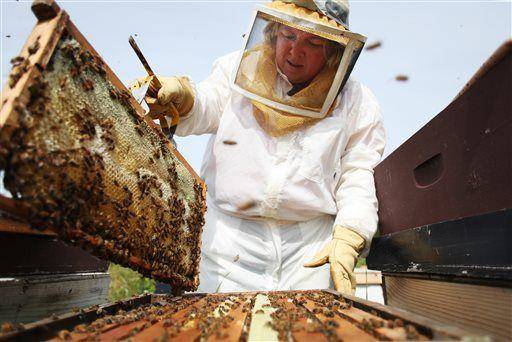It’s probably the sweetest gift there is. Honey has been a symbolic offering for thousands of years. In ancient Egypt, beekeepers would gather honey to prevent diseases and heal wounds. The Greeks gifted honey to their Gods as a sacrificial offering.
Even in the Bible, the term “milk and honey” is described to the Israelites as the bounty of the promised land in Canaan, Exodus 3:8.
The sweetness of honey has slipped into holiday traditions around the world. During the Jewish holiday of Rosh Hashanah, apples are dipped into honey and honey cake is eaten to welcome the new year. Challah bread, an eggy sweet bread eaten during the Jewish holidays is typically sweetened with honey. During the Madhu Purnima, which was celebrated in September this year by Buddhist in India and Bangladesh, it is traditional to gift honey to Buddhist monks during the festival. In Greece, special Christmas cookies called melomakarona are dipped in honey and covered in chopped walnuts. During the holy month of Ramadan, Muslims enjoy honey-drenched dishes, like the bite-sized honey puffs called loukoumades.
With thousands of species of bees and varying flora across the globe, no jar of honey is the same. Besides supporting the local economy, there can be other benefits to buying your honey products locally.
James Reid along with his sister Ana, run Stoked Beekeeping Company in Homer. He said eating locally harvested honey connects you to the land and flora around you.
They harvest honey and sell it raw, and also use the beeswax to make specialty, food-safe cloth wraps. James Reid said honey is made using local pollen and nectar. He said eating their byproducts can help acclimate a body to the pollen of local flora, which in turn can help with seasonal allergies.
To get the community more involved with local honey, the Reids offer tours of their hives every summer.
Sarah Souders of Sarah’s Alaska Honey has been harvesting honey for 18 years. She said honey harvested on the Kenai Peninsula is special because of the pollen taken from vast fields of fireweed.
“Alaska honey is unique and light in flavor,” she said.
She said local honey makes a great gift, and her stock usually runs out after Christmas time.
“It’s much more personal than something from Wal-Mart,” Souders said.
It’s not just Alaskans who seek out Kenai Peninsula honey. Souders said she has people from all over the world call her to order honey.
“Someone from Qatar has been calling me all week trying to order our fireweed honey,” she said.
She said she limits her sale of honey online to try to focus on selling to locals first.
Souders will be hosting a beekeeping class next month. Information for the class can be found on Sarah’s Alaska Honey Facebook page.
To find Sarah’s honey, give her a call at 907-252-5132. James Reid said his honey can be found at the Homer Salmon Sisters Shop or by calling him at 424-558-1015, or emailing him at stokedbeekeeping@gmail.com.

